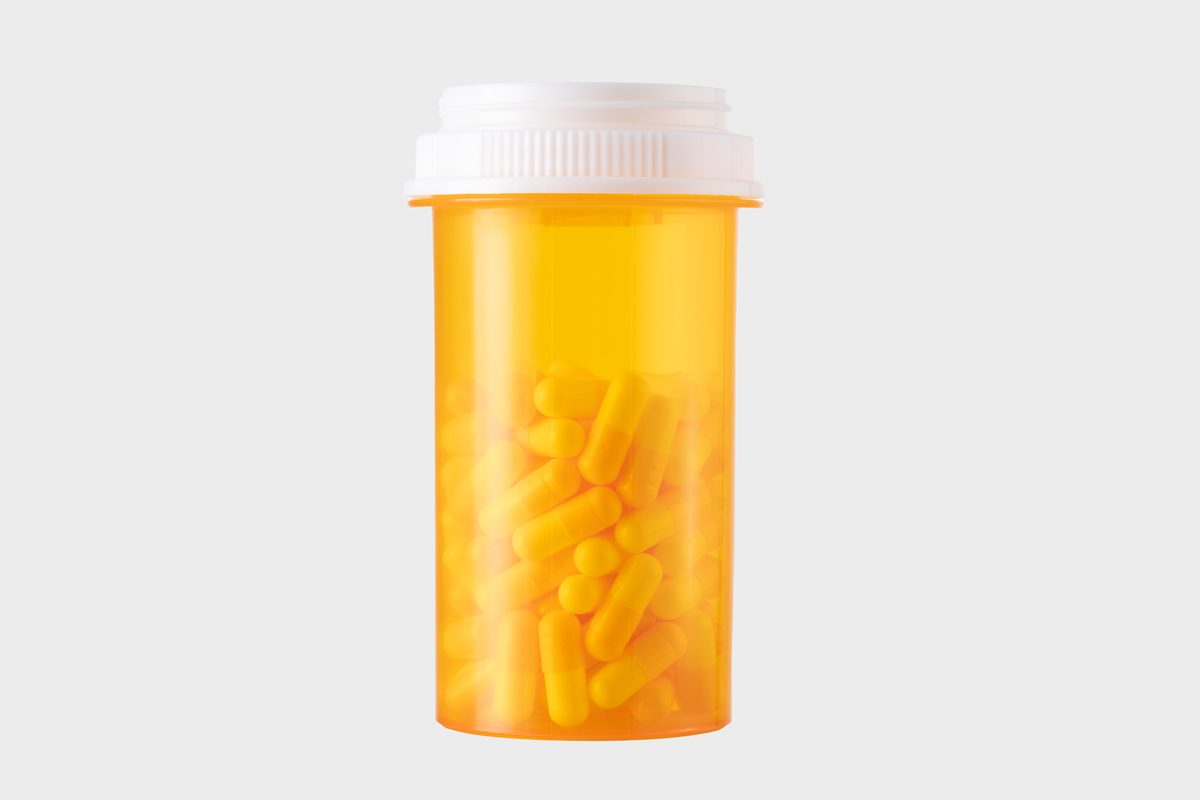It's the generic for one of the most-prescribed drugs treating America's 21 million individuals managing depression. Here's the unusual recall reason.

More Than 230,000 Bottles of a Popular Antidepressant Have Been Recalled Nationwide

As society rightly challenges the stigmas surrounding mental health, many individuals are now getting the help they need to treat their psychologic conditions. In particular, the National Institutes of Health notes that depressive disorders are among the most common conditions in the United States, affecting at least 21 million Americans each year. Further, according to data from the Centers for Disease Control and Prevention (CDC), 13% of surveyed adults reported taking anti-depressant drugs within the 30 days prior.
Given the high prevalence of antidepressant prescriptions, a new recall has sparked concern over one particular type of drug. On November 19, the East Brunswick, NJ-based drug manufacturer Rising Pharma, Inc., issued a voluntary recall of more than 230,000 bottles of duloxetine, one of the most common SNRIs (serotonin and norepinephrine reuptake inhibitors). The Cleveland Clinic notes that brand names include of duloxetine include Cymbalta, Drizalma, and Irenka. It’s been stated by one doctor of pharmacy publishing market research that over 4,000,000 Americans took duloxetine in 2022, resulting in more than 18,000,000 prescriptions. This makes it approximately the 31st most-prescribed drugs in America.
The FDA reports that the recall was initiatiated after it was discovered that the products contained elevated levels of N-nitroso-duloxetine (NDXT), which has been identified as potentially carcinogenic when present in high concentrations and ingested over a long period of time.
Some experts note that N-nitroso-duloxetine is a type of nitrosamine, an organic compound that we’re exposed to in a range of everyday settings—reports the FDA: “They exist in low levels in our water and foods, including meat, vegetables, and dairy products.” However, the amount of nitrosamines in the recalled drug surpassed a predetermined threshold, putting the company in violation of Current Good Manufacturing Practices (CGMP), a set of regulations intended to ensure safety and quality.
On December 5, the U.S. Food and Drug Administration (FDA) updated the recall report to label the incident as a Class II recall. This suggests “a situation in which use of or exposure to a violative product may cause temporary or medically reversible adverse health consequences or where the probability of serious adverse health consequences is remote.”
Class II recalls represent the middle tier in a three-tier system used to identify a product’s risk level to the public. Though products that heighten cancer risk are typically given the highest risk level, this moderate approach may have been selected due to the relatively low likelihood of this outcome. In fact, the FDA notes that people taking drugs that contain certain types of nitrosamines “at or below the acceptable intake limits every day for 70 years are not expected to have an increased risk of cancer.” Their experts add that “no increased risk of cancer is observed when patients are exposed to nitrosamine impurities at safe levels.”
That said, the FDA is currently investigating several drugs containing nitrosamines, “including those used to treat elevated blood pressure, heartburn, acid reflux, and diabetes.” Several drugs besides duloxetine—including angiotensin II receptor blockers (ARBs), ranitidine, nizatidine, and metformin—have recently been recalled because of nitrosamine impurities, the health authority notes. In October, more than 7,000 bottles of duloxetine manufactured by Towa Pharmaceutical Europe were recalled for the same reason.
Consumers can identify the specific lots affected by the recall by checking the lost numbers and expiration dates on the products:
Duloxetine Delayed-Release Capsules USP, 20 mg (milligram), 60 count bottles
- Lot numbers: DT2022023A, DT2022024A, DT2022025A, DT2022026A, DT2022027A; Expiration date: Nov. 2024
- Lot numbers: DT2023001B, DT2023004A, DT2023005A, DT2023006A; Expiration date: Jan. 2025
Duloxetine Delayed-Release Capsules USP, 30 mg, 30 count bottles
- Lot number: DT3023019A; Expiration date: Jan. 2025
- Lot number: DT3023050A; Expiration date: Apr. 2025
Duloxetine Delayed-Release Capsules USP, 30 mg, 90 count bottles
- Lot number: DT3023022A; Expiration date: Jan. 2025
Duloxetine Delayed-Release Capsules USP, 30 mg, 1,000 count bottles
- Lot numbers: DT3022108A, DT3022107A, DT3022106A, DT3022111A, DT3022109A; Expiration date: Nov. 2024
- Lot numbers: DT3023001A, DT3023003A; Expiration date: Dec. 2024
- Lot numbers: DT3023024A, DT3023020B; Expiration date: Jan. 2025
- Lot numbers: DT3023027A, DT3023028A; Expiration date: Feb. 2025
- Lot number: DT3023034A; Expiration date: Mar. 2025
- Lot number: DT3023049A; Expiration date Apr. 2025
- Lot number: DT3023095A; Expiration date Jul. 2025
Duloxetine Delayed-Release Capsules USP, 60 mg, 30 count bottles
- Lot numbers: DT6023059A, DT6023060A, DT6023065A, DT6023069A, DT6023070A; Expiration date: Jan. 2025
- Lot number: DT6023080A; Expiration date Feb. 2025
- Lot number: DT6023093A; Expiration date Mar. 2025
- Lot number: DTC24012A; Expiration date Dec. 2025
Duloxetine Delayed-Release Capsules USP, 60 mg, 90 count bottles
- Lot number: DT6023108A; Expiration date: Apr. 2025
- Lot number: DTC23201A; Expiration date: Aug. 2025
Duloxetine Delayed-Release Capsules USP, 60 mg, 1,000 count bottles
- Lot numbers: DT6022160A, DT6022165A, DT6022162A, DT6022164A, DT6022163A, DT6022171A, DT6022169A, DT6022170A, DT6022173A; Expiration date: Nov. 2024
- Lot numbers: DT6023009A, DT6023007A, DT6023008A, DT6023011A, DT6023034B; Expiration date: Dec. 2024
- Lot number: DT6023067C; Expiration date: Jan. 2025
- Lot number: DT6023114A; Expiration date: Apr. 2025
- Lot number: DTC23243A; Expiration date: Oct. 2025
- Lot number: DTC24040A; Expiration date: Dec. 2025
If you believe you have the affected drugs in your possession, contact your pharmacy or medical provider, who may write you a new prescription. The trade publication Healthcare Executive reports, “Rising Pharmaceuticals recommend that patients stop taking the recalled duloxetine immediately and seek a new prescription. Pharmacies have been alerted about the recall and are no longer distributing the recalled pills.”
For daily wellness updates, subscribe to The Healthy by Reader’s Digest newsletter and follow The Healthy on Facebook and Instagram. Keep reading:




















